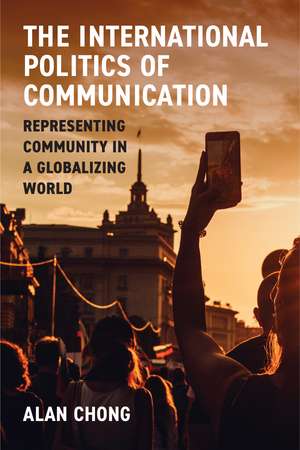The International Politics of Communication: Representing Community in a Globalizing World
Autor Alan Chongen Limba Engleză Paperback – 18 mar 2025
The International Politics of Communication examines this informational dimension of international politics, investigating how information is generated, conveyed through channels, and directed specifically at audiences. While citizens are often portrayed as faithfully loyal supporters and beneficiaries of the modern nation-state—a fiction supported by passports, identification papers, and other notarized credentials—they are subject to the pulls of loyalty from transnational tribal affiliations, mythological and historical narratives of ethnicity, as well as the transcendental claims of religion and philosophy. Increasingly, social media also enchants non-state individuals, providing new virtual communities as the center of loyalties rather than national affiliations. By reinterpreting taken-for-granted concepts in journalism, media, political economy, nationalism, development, and propaganda as information politics, this book prepares serious-minded scholars, citizens, politicians, and social activists everywhere to understand the power plays in international communication and use alternatives to begin transforming power relations.
Preț: 339.42 lei
Nou
Puncte Express: 509
Preț estimativ în valută:
64.95€ • 67.99$ • 53.74£
64.95€ • 67.99$ • 53.74£
Carte nepublicată încă
Doresc să fiu notificat când acest titlu va fi disponibil:
Se trimite...
Preluare comenzi: 021 569.72.76
Specificații
ISBN-13: 9780472057313
ISBN-10: 0472057316
Pagini: 456
Ilustrații: 3 images, 1 table
Dimensiuni: 152 x 229 x 30 mm
Greutate: 0.59 kg
Editura: UNIVERSITY OF MICHIGAN PRESS
Colecția University of Michigan Press
ISBN-10: 0472057316
Pagini: 456
Ilustrații: 3 images, 1 table
Dimensiuni: 152 x 229 x 30 mm
Greutate: 0.59 kg
Editura: UNIVERSITY OF MICHIGAN PRESS
Colecția University of Michigan Press
Notă biografică
Alan Chong is Senior Fellow at the S. Rajaratnam School of International Studies in Singapore.
Cuprins
Contents
Acknowledgments
Chapter 1- International Communication as Political
Chapter 2- The Power of Sources: Governments and Journalists
Chapter 3- Channel Power: Media Form, Political Implications
Chapter 4- Audience Power
Section 2: On Community in International Communication
Chapter 5- Community I: Nations, Civilizations & Ideology in Intercultural
Chapter 6- Community II: Development & Communications
Chapter 7- Community III: Transparency & Good Governance
Section 3: On Socialization
Chapter 8- Socialization I: Diplomacy & Propaganda
Chapter 9- Socialization II: Non-State Actors & Transnational Internet Politics
Chapter 10- Socialization III: Peace Education and Tourism
Chapter 11- Socialization IV: Politics of the Globalization of Popular Culture in Film
Chapter 12- Conclusion – The International Politics of Communication lie between National Security and Cosmopolitan Community
Bibliography
Acknowledgments
Chapter 1- International Communication as Political
Chapter 2- The Power of Sources: Governments and Journalists
Chapter 3- Channel Power: Media Form, Political Implications
Chapter 4- Audience Power
Section 2: On Community in International Communication
Chapter 5- Community I: Nations, Civilizations & Ideology in Intercultural
Chapter 6- Community II: Development & Communications
Chapter 7- Community III: Transparency & Good Governance
Section 3: On Socialization
Chapter 8- Socialization I: Diplomacy & Propaganda
Chapter 9- Socialization II: Non-State Actors & Transnational Internet Politics
Chapter 10- Socialization III: Peace Education and Tourism
Chapter 11- Socialization IV: Politics of the Globalization of Popular Culture in Film
Chapter 12- Conclusion – The International Politics of Communication lie between National Security and Cosmopolitan Community
Bibliography
Recenzii
“The International Politics of Communication shows mastery of a range of diverse literatures and cases, and carves out a distinct focus area in the political science literature around media in world society. It considers international communication in today’s global context as inherently a political process, in which factors of technology and national power and commercial interest and socialization are all interacting.”
“This is a project that I have been dreaming of doing myself, or wishing someone else would do. Without simply critiquing the traditional International Communications and International Relations theories (though they do this as well), the author masterfully weaves them together, adding more sources, especially the ones whose voices have been less heard in the past.”
“Despite the centrality of communication in international politics, it has received relatively limited academic attention. Chong’s new book ably fills the existing gap in the scholarship and is a very welcome addition to the literature on IR and international communication.”
“This is a project that I have been dreaming of doing myself, or wishing someone else would do. Without simply critiquing the traditional International Communications and International Relations theories (though they do this as well), the author masterfully weaves them together, adding more sources, especially the ones whose voices have been less heard in the past.”
“Despite the centrality of communication in international politics, it has received relatively limited academic attention. Chong’s new book ably fills the existing gap in the scholarship and is a very welcome addition to the literature on IR and international communication.”
Descriere
Revealing the constant communication that affects politics around the world
